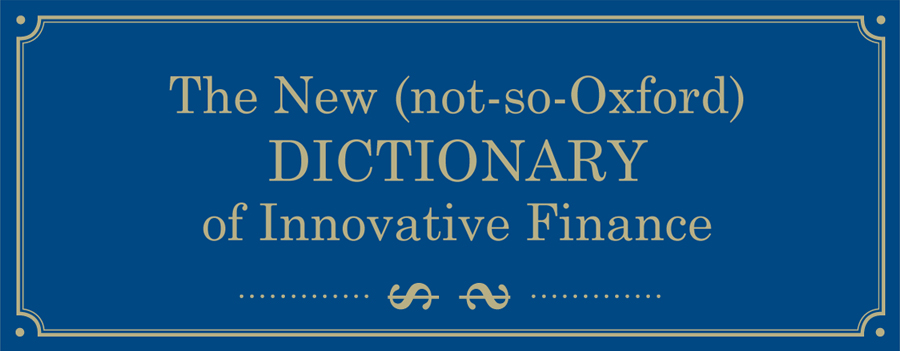Innovative finance is a new and growing field. It’s also the source of many questions, like how is it defined? How is it practiced, internationally and in South Africa? What are the challenges and points of debate? Who’s doing it? And how can other players get involved? Let’s look it up.
Innovative finance is like a genetically modified funding mechanism. It’s a hybrid creature comprising investment and social impact in balanced, if not equal, measures. More than that, it completely disregards the arbitrary split between for-profit and non-profit.
In short, innovative financing is an approach to funding enterprises and interventions that create positive social and environmental impact. It looks to use all available financial and philanthropic tools to support the growth of these enterprises and, when the existing tools don’t work, it promptly creates new ones.
Clearly, innovative finance is an innovative thing. And the field is growing dramatically across the world. Trillions of dollars (and many other currencies) are being directed towards creating social and environmental impact alongside and intertwined with financial return. This impact is being felt in all sectors, from education to renewable energy, and by communities of all sizes, from villages to entire countries.
In the United States, according to the Forum for Sustainable and Responsible Investment (US SIF), one in nine dollars (meaning $3.74 trillion or R40 trillion) is now being invested sustainably. Finally, finance is being redesigned to direct capital towards social issues, not just more capital. We need to understand this new area completely if we want to see it have all the social and financial impact it can.
Fact: In a 2013 Accenture survey, 93% of CEOs said sustainability was essential to their company’s survival.
First, some definitions
Responsible Investment (RI) – according to The Financial Times, RI is an investment strategy aimed at generating both financial and sustainable value. It does this by integrating environmental, social and governance (ESG) and ethical issues into financial analysis and decision-making.
Socially Responsible Investment (SRI) – Dr Stephanie Giamporcaro, senior lecturer at the UCT Graduate School of Business and an authority on SRI approaches in Africa (see → here), defines it as, “a generic term covering any type of investment process that combines investors’ financial objectives with their concerns for ESG issues”.
Environmental, Social and Governance (ESG) – an investment strategy focusing on sustainability, ethical impact and financial return or, according to the UN Principles for Responsible Investment, on “environmental, social, and corporate governance issues”.
Double Bottom Line – the idea of making a financial and an impact-related profit. In other words, seeking ROI (return on investment) and social or environmental change simultaneously.
Triple Bottom Line – seeking financial, social and environmental impact simultaneously.
Total Portfolio Optimisation – using strategies that activate an entire portfolio (not just the 5% dedicated to grant capital) towards a mission. Examples include attempts to optimise the portfolios of high-net-worth individuals (HNWs) and foundations for financial and social impact.
Blended Value Proposition (BVP) – a concept developed by sustainable finance specialist Jed Emerson to acknowledge that all organisations create a “blend” of financial and non-financial value. A company’s value is, “fundamentally indivisible,” says Emerson. This means we cannot distinguish between “economic value”, “social value” or “environmental value” – they are simply pieces of a greater valuable whole.
Patient Capital – pioneered by the Acumen Fund, this refers to a long-term investment that maximises social rather than financial return. Acumen describes it as “a debt or equity investment in an early-stage enterprise providing low-income consumers with access to healthcare, water, housing, alternative energy, or agricultural inputs”.
Benefit corporation (B Corp) – a new class of corporation that voluntarily meets higher standards of purpose, accountability and transparency. The structure is designed for for-profit entities that want to take social and environmental issues (as well as profit) into consideration when making decisions.
And now, some product terminology
Venture Philanthropy – according to the European Venture Philanthropy Association (EVPA), “[it] works to build stronger social organisations by providing them with both financial and non-financial support in order to increase their social impact”. See → here for a funder’s perspective on this high-impact investment field.
Social Impact Bond (SIB) – the Rockefeller Foundation defines a SIB as: “an innovative method of financing social programmes in which governments partner with service providers and private sector investors to fund social programmes. Investors are repaid if and when improved social outcomes are achieved. Thus, government pays only if the services are successful at meeting the needs of its citizens”. Read about the first SIB and how it funded prisoner reform → here.
Development Impact Bond (DIB) – a variation on the SIB where private outcome payers – such as Development Finance Institutions (DFIs) or foundations – partner with or take the place of government in funding social impact in developing countries. As in the case of a SIB, investors only earn a return if predefined outcomes are achieved.
Microfinance – the lending of small amounts of money to entrepreneurs and small businesses at reasonable interest rates.
Charity Bond – pioneered in the UK, this kind of bond gives charities access to medium-term debt finance, allowing for less volatility in cash flow. For instance, a charity could borrow the amount for a project upfront and then fundraise for it while the project is in operation and has results to show.
Diaspora Bond – a model that allows investors who live outside of their home countries to put capital to work on local projects. For example, Ghanaians living in England can invest in Diaspora Bonds that then finance or lend money to projects within Ghana.
Social Stock Exchange – a space where people can buy shares in social businesses with missions they support. In other words, this type of stock exchange exists to connect socially motivated investors with sustainable enterprises in which to invest.
Crowdfunding – commonly defined as, “the practice of funding a project or venture by raising many small amounts of money from a large number of people, typically via the Internet”.
Themed Bond – this is a bond issued to investors who pledge to use their proceeds to fund an advertised theme, such as water, green or renewable energy.

